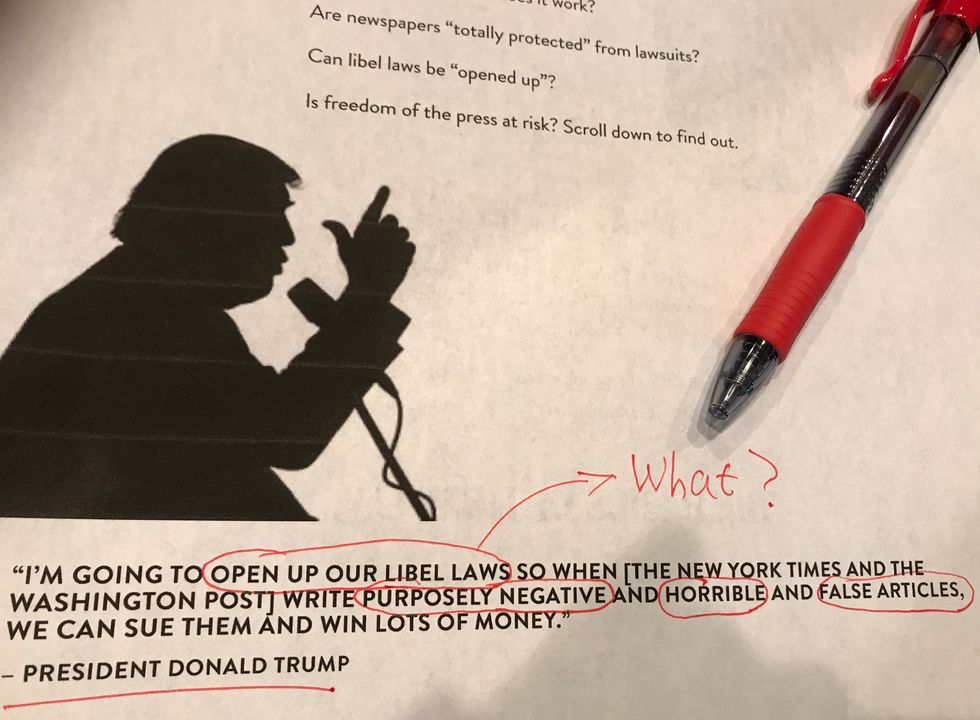As the year 2017 continues its circus of events and points of circumstance, we find ourselves at a crossroads in regards to truth and opinion. Truth, already a relative term that often changes with various perspectives and mindsets, becomes further convoluted when our President is concerned. To quote John Oliver, “we have a President capable of standing in the rain and saying it was a sunny day.”
However, it is not Mr. Trump’s frivolity in facts that I wish to address here. (At least not completely) No; I would like to focus your attention specifically on the issue of defamation—libel laws—and how they are addressed and regulated in concerning the first amendment. Let’s review:
In recent months, Mr. Trump has frequently claimed that he will be “calling for changes to the country’s libel laws.” His wording, specifically, is that he will “open up our libel laws so when they write purposely negative and horrible and false articles, we can sue them and win lots of money.”
Well, there are a few things to pick out here that are of concern. First of all, what does he mean by ‘opening up’ libel laws? Laws dealing with libel and defamation are up to the states and the states alone. There is no federal or government jurisdiction that the President can ‘open up.’ Then of course, there is the question of “purposely negative,” “horrible,” and “false articles.” While Mr. Trump says this with such surety, it is in fact much harder to prove a case of libel in the United States.
Let’s narrow our focus even further: what is libel? To quote, it is “the publication of false statements of ‘fact’ that damage someone’s reputation” As our President stated, these are “purposely negative” and “horrible” publishings of supposedly false pretense, correct? Mind you, in the American law system, the burden of proof lies on the plaintiff, the accuser, not the defense. Mr. Trump will have to prove that the news institutes in question (such as the New York Times) published certain presumed facts about him that were untrue, and defamed or damaged his reputation. And, in addition, Mr. Trump is a public figure; this raises the expectation higher in regards to the burden of proof. He will have to prove that the false publication not only damaged his reputation, but with the purpose of malicious intent. If he can prove this, than he can be granted proper compensation.
Again though, why? Not only does the burden of proof lie with the offense, but it is also a case of your first amendment rights in jeopardy. It becomes an issue of censorship and screening if the government and state body interfere too much in the case of libel. Under the first amendment, it reads that “Congress shall make no law respecting an establishment of religion, or prohibiting the free exercise thereof; or abridging the freedom of speech, or of the press; or the right of the people peaceably to assemble, and to petition the government for a redress of grievances.”
How does this apply to libel cases and defamation issues? Well, there was a significant case involving libel and the first amendment in 1964 titled “New York Times Co. v. Sullivan.” If you haven’t heard of this case I highly suggest you read up on it—fascinating and particular important to understand fully.
To summarize:
New York Times Co. v. Sullivan
A libel suit is instigated by the plaintiff, L. B. Sullivan, who claims that the New York Times published a false add that unfairly portrayed the Montgomery police—further defaming him personally. Note, “under Alabama law, Sullivan did not have to prove that he had been harmed,” giving the accuser the benefit of the doubt rather than the defense. The Alabama court ruled in favor of the Plaintiff, awarding a judgment $500,000. This was in turn appealed all the way to the U.S. Supreme Court where the Justices held a unanimous decision in favor of the New York Times. The majority opinion was written by Justice Brennan:
“Because of the importance of the constitutional issues involved, we granted the separate petitions for certiorari of the individual petitioners and of the Times. 371 U.S. 946. We reverse the judgment. We hold that the rule of law applied by the Alabama courts is constitutionally deficient for failure to provide the safeguards for freedom of speech and of the press that are required by the First and Fourteenth Amendments in a libel action brought by a public official against critics of his official conduct.” To sum, the plaintiff must prove the false publication was made with intended malice—such that damaged the accusers public reputation. Otherwise, the first amendment holds.
What made this decision particularly important in regards to current affairs was the undeniable support the Justices at the time held for the first amendment. It is this right that allows us to speak out against the government, write opinions on public officials, and protest against any federal or state action we deem as unjust. As I wrote in my previous article on the fourth amendment, a right cannot be taken away from you unless it is through legal due process.
The first amendment is your unquestionable right to speak out against the government as well as freely express your beliefs and religion (except under certain conditions involving the imminent threat to life, etc.). Specifically in regards to libel and public figures, I would argue the most important aspect of the first amendment that must be understood and remembered is that it is the unpopular and often disliked speech that needs the most protection.






 The minimum wage is not a living wage.
StableDiffusion
The minimum wage is not a living wage.
StableDiffusion
 influential nations
StableDiffusion
influential nations
StableDiffusion












